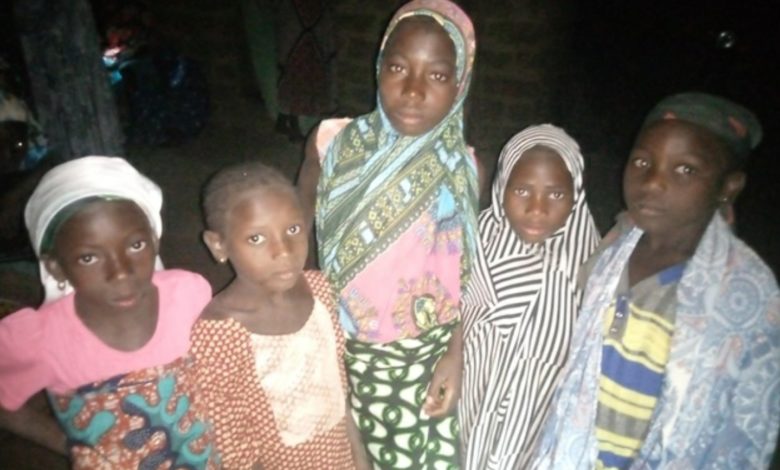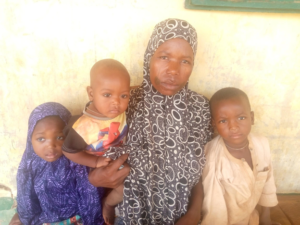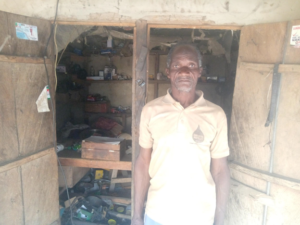Evicted By Guns (II): Niger State Inhabitants Jostling Between Hunger, Anxiety, Despondency As Banditry Lingers
HumAngle narrates the story of women, children and other inhabitants who have been widowed, orphaned or pillaged in Niger State by terrorists known locally as bandits.

The quintet; Aisha, Safeena, Mashekura, Zaituna and Muslima were orphaned by the marauding terrorists who murdered their parents. Their grandfather, Bawa Doma from Unguwan Gabia, Magami, wore a fake smile as he recounted how his family was thrown into perpetual mourning.
“It took us time to get over the loss,” Doma, presumably in his 60s, said as he battled to stop tears rolling down his cheeks. “They don’t even know about their biological father’s death,” he said, pointing at the five children.
Only one among them, ‘Samira’, according to him, knows of her father’s demise, the rest are yet to realise.
Like the five kids, Saha, a mother of eight is passing through a traumatic moment. Her husband, Saminu Kure, was killed by the terrorists in one of the attacks on their village, Zungeru.
With her eight children, Saha often feels frustrated about how life treats her. “I can’t take care of these kids alone,” she cries. Life has been harder since her husband’s death. Now, she does menial labour to raise the rest of the children.

“Even if I didn’t see anything to eat, I make sure my children eat. I either beg or work for a pittance,” she says. “That’s the little I can afford, I’m not capable of sending them to schools.”
Rape, destruction, looting unhinged
As terrorists —who, some call bandits— keep up their raids on villages in Niger State, they leave behind tarumatised girls and women who they rape during those attacks. At least three minors between the ages of 11 and 13 were reportedly raped by them.
In Magami, a 12-year-old daughter of a community leader was molested by the bandits during the first attack on the community. “It was very sad and traumatising to see her losing her pride at that age,” says the distraught father of the girl.
But as parents, and sexual abuse vicims nurse their wounds, shop owners also count their losses.
Yunusa, 55, had his auto-spare part shop looted by the attackers during one of their incursions. “I don’t have anything left. No expectation too, except death,” he said.
COVID-19: no palliatives, despite tragedies and restrictions
Despite their predicament, villagers in Magami did not receive palliatives distributed by the government to cushion the impacts of the COVID-19 pandemic. Yet, they are restricted to their village; by the bandits and by the government to contain the spread of COVID-19.
“We dare not go to Kuta town to get some items for our upkeep for the fear of getting arrested by the task force parading the state,” said Musa, a resident of Magami.
Dwelling in a ramshackle, the extended family of Yussuf Sauri, whose village ‘Sarkin Zama’ was pillaged by the bandits in August 2019, lives in hunger and lack.
Ayuba, Garba, and Joshua, Sauri’s sons, who are now the breadwinners of the family following Sauri’s demise, lament that they are dying of starvation. Ayuba, who is the eldest, said “we are farmers but sadly we are dying of starvation. We can’t go to farms, let alone harvesting our farm produce.”
“The government is aware of our situation. They just take pleasure in neglecting us,” Garba interjects.
“We heard on the radio about COVID-19 palliative, but it was not sent to us here and they didn’t allow us to get our needs in the town.”
Joshua’s daughter, Martha, also shared her thoughts: “I can forget all seasons in this bush, but not the raining season.”
She continued, “we sleep on our feet whenever it rains.” Pointing to her siblings, she recounts their sufferings during the season. “We can’t condone seeing them sleeping on a damp floor of the huts. Rather, we spread nylons on the floor and cover them with another one.”
Elsewhere, the large family of Bawa Doma managed to get a half bag of maize from their relatives residing in the township of Gurmana, Shiroro Local Government.
By the time the maize got to them, they were infested. A woman in her 40s emphasised that bugs had eaten out the nutrients in the maize. She queried this reporter, stretching a handful of the maize to him, “can you feed on this?”
More voices mumbled, “it looks poisonous,” “half bag for a large family like ours.” Another woman standing in solitude, pointed to the reporter’s nose mask, saying “even this was not given to us despite their aggressive radio campaign.”
Attempts made to verify these claims did not yield any result as Ahmed Matane, the Secretary to the Niger State Government (SSG), did not respond to calls and SMS sent to his phone.
Matane doubles as the Chairman, Niger State COVID-19 Task Force inaugurated by the state’s governor, Abubakar Sani Bello.
Soldiers manning the criminals’ territory
Muktari Kure, a resident of Zungoro village, Shiroro Local Government, alleged an unclear conspiracy of the Nigeria Army in the crime processes. He revealed that soldiers are on the ground at Goska, a direct route to Dansado where the bandits are settled.
Kure, once a victim of kidnapping, said he was held down when he took a ransom of N1 million for the release of some abducted children.
He lucidly alleged a possible involvement of soldiers in the atrocities bedevilling the communities. Asked for his reasons, Kure said “before you enter into the kidnappers’ abode, ‘Dansado’, armed soldiers are present at Goska, grilling anyone going in and out the Dansado bush.”
Kure said he left his village alongside a young man, who the soldiers asked to stay with them till he returned.
After hours of waiting for his return, the boy was told to go back home because it’s evident he (Kure) won’t be released.
To Kure, how he escaped from the kidnappers’ den without ransom exchange was by the providence. “As luck would have it, they all fell asleep. That was how I tardily escaped from them.”
Following Kure’s allegation, the Army spokesman, John Enenche, a Maj-Gen. when contacted said it was not intelligence-wise to discuss national security on the phone.
His words: “It’ll be very stupid of me to discuss security matter on the telephone. You might be an informant aiming to get information from the security officials.”
The prerequisites of a journalist seeking information on security matters as stated by Enenche is to first become a Defence Correspondent and then get a physical appearance to obtain the needed information.
Support Our Journalism
There are millions of ordinary people affected by conflict in Africa whose stories are missing in the mainstream media. HumAngle is determined to tell those challenging and under-reported stories, hoping that the people impacted by these conflicts will find the safety and security they deserve.
To ensure that we continue to provide public service coverage, we have a small favour to ask you. We want you to be part of our journalistic endeavour by contributing a token to us.
Your donation will further promote a robust, free, and independent media.
Donate HereStay Closer To The Stories That Matter





